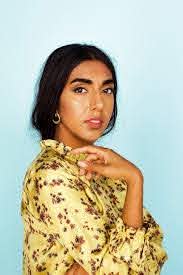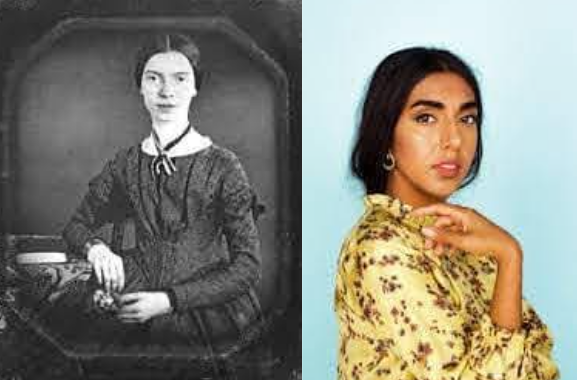My favorite poems are the ones that leave me feeling like I’ve just been punched in the gut.
That sounds strange, but you know what I mean. You know when you’re vibing to a song, and then suddenly there’s a line that makes you freeze and start the whole song over? I think the best poems are like that. They shock you, or hurt your feelings, or make you feel less alone. They tell the truth.

I’m not explaining this well, so I’ll just piggyback off the words of one of the best poets there is. Emily Dickinson, the original badass poetry queen herself, once said, “If I read a book and it makes my whole body so cold no fire can warm me, I know that is poetry. If I feel physically as if the top of my head were taken off, I know that is poetry. These are the only ways I know it. Is there any other way?”
With this in mind, I went on a search for the best poems by the best female poets. I asked a friend, I googled, I did my research. And I came up with this list of five great, hard-hitting, touching, sometimes dark, always real poems. (A quick warning before you jump in: most of these poems cover serious subjects that could potentially be triggering, so please take care.)
All of these poems make me want to curl up under a blanket and have an existential crisis while listening to Sufjan Stevens’s entire discography. But like…in a good way. I hope you love them all as much as I do!
“Lady Lazarus” by Sylvia Plath
The lines that hit the hardest: Dying / Is an art, like everything else. / I do it exceptionally well. // I do it so it feels like hell. / I do it so it feels real.
This poem was written by Sylvia Plath in 1962. The speaker is Lady Lazarus, a reference to the biblical figure Lazarus (a man who Jesus resurrected). Lady Lazarus laments that she is like a cat with nine lives, resurrected again and again against her will. She goes through the process of being resurrected, growing increasingly frustrated by her savior’s efforts and the audience that her resurrection has attracted. She calls them “the peanut-crunching crowd,” gathered to see “the big strip tease” as the savior unwraps her burial clothes. There is a lack of agency here; she is nothing more than the doctor’s “opus.” She is on display, her pain becomes simply a spectacle, and she considers charging money from the crowd “for the eyeing of [her] scars.” These feminist themes grow stronger as the poem goes on, until eventually she directs her threats to God Himself: “Herr God, Herr Lucifer / Beware…I eat men like air.” A biblical figure threatening God after being resurrected is impactful enough—but coupled with the implications about feminism and how difficult it is to survive in a world dominated by men, this poem isn’t easy to forget.
“Caged Bird” by Maya Angelou
The lines that hit the hardest: for the caged bird / sings of freedom
Maya Angelou always has a place on a list like this. This poem, published in 1983, juxtaposes two birds. One bird is free, confident, and “names the sky his own.” The other is trapped in a cage. The caged bird is afraid, but he sings for the things he still wants even though he’s trapped. This poem is about oppression, specifically the oppression of Black people in the U.S. The bird’s song is an expression of pain. He longs for freedom from that oppression. The caged bird, whose “wings are clipped and…feet are tied,” is in an unnatural oppressed state. In contrast, the free bird demonstrates that freedom is natural—but it is also a privilege. The bird is emboldened by his freedom and demonstrates that privilege when he “dares to claim the sky.” The free bird does not have to think about his freedom, while the caged bird is exhausting himself as he tries to cope with the oppression he is experiencing. It’s an important comment on the relationship between races in the U.S. and the oppression that Black people experience at the hands of white people. Maya Angelou grew up during the Civil Rights Movement, which had a profound effect on her life and work, and her poetry has never been more relevant—or more affecting.
“The Moose” by Elizabeth Bishop
The lines that hit the hardest: Why, why do we feel / (we all feel) this sweet / sensation of joy?
Elizabeth Bishop said that this poem took her 20 years to write. Published in 1972, it tells of a bus ride across Nova Scotia. The speaker chronicles the scenery as the bus drives into the night. She listens to the passengers and begins to fall asleep, but the bus comes to a sudden stop: There’s a moose in the middle of the road. This poem has stuck with me for a reason I still can’t quite figure out. It’s about human connection and the recognition of strangers who are like you. For example, the grandparents on the bus are talking about people they know, but these could be people we all know. And the speaker seems to recognize that as she eavesdrops, relating so closely to this conversation that she understands the vague repetition of “yes” to mean “Life’s like that. / We know it (also death).” Then, all of the bus riders come together to look at the moose; the speaker notes that “we all feel” the excitement. In that moment, all of these people are connected. They become childish as they look at the moose; for just a few minutes, the normal reservation and civility of adulthood disappears as they make childlike observations like “Look! It’s a she!” This reflection on nature and its power to connect people emphasizes the larger theme of human connection and relationships. It’s a subtle poem, but moving nonetheless.
“Resumé” by Dorothy Parker
The line that hits hardest: “You might as well live.”
This short rhyme was written by Dorothy Parker in the 1920s. Dark and also somehow hopeful, the poem details seven methods of suicide. The speaker contemplates each method and dismisses them for different reasons. This suggests that the speaker is looking for reasons not to end their life; in fact, by the end of the poem, they decide that living is the best option. (After all, remove the accent, and “resumé” becomes “resume.”) Parker wrote this poem from a very personal place. After her first suicide attempt, Parker’s friend visited her in the hospital and told her, “You might as well live.” That statement became the poem’s final, hard-hitting line. For such a short poem, it sticks with you long after you read it.
“Most importantly love like it’s the only thing you know” by Rupi Kaur
The lines that hit the hardest: who you loved / and how deeply you loved them / how you touched the people around you / and how much you gave them

Of course, I have to end this list with a modern poet, revolutionary in her own right: Rupi Kaur. Kaur rose to international fame after she self-published her book Milk and Honey in 2014. She ushered in the era of the “Instapoet,” writers who publish their work on social media. Poetry sales were at a low before Kaur came onto the scene; now, poetry books are regularly best-sellers, prompting many to call Instapoetry the savior of poetry. (That’s not to say that it’s always popular. The creation of Instagram poetry has raised the age-old question about what qualifies as art, and plenty of critics have some not-so-nice things to say about it.) In this poem, the speaker considers her life and decides “all this / means nothing.” The trivial things we worry about—or even the big things—don’t matter. Instead, the speaker concludes, “nothing even matters / except love and human connection.” Common themes in Kaur’s poems include self-love and relationships, and this poem falls right into that category. A lot of people feel deep connections to Kaur’s poetry; her third poetry collection, home body, is set to release on November 17, 2020. Love it or hate it, Instapoetry is here to stay—and it often resonates.
I narrowed this post down to five, but it’s definitely an incomplete list! There are thousands of amazing poems that deserve more love. So you tell me—what did I miss? What should I be reading? Let me know in the comments! In the meantime, I’m going to go read “Diving into the Wreck” by Adrienne Rich and quietly freak out.
Now that’s how you know it’s a good poem.
